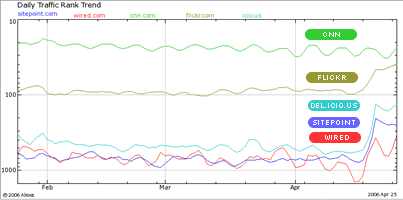It seems to have passed without much comment, but there seem to have been some significant changes at Alexa recently — most notably sites that appeal to a more tach-savvy audience are making huge leaps up the rankings. The phenomenon can be seen clearlyacross all major web development sites — from W3Schools.com to W3C.org to SitePoint.com — but also across a long list of sites with more general appeal to tech users, such as Flickr.com, Del.icio.us and Slashdot.org.
Meanwhile sites with no notable ‘tech-skew’ (i.e. CNN.com, EBAY.com, etc) have either held firm or been shuffled backwards by the sites bubbling up around them.
It raises some interesting questions:
- Have Alexa changed their statistical algorithms?
- Is this a temporary anomoly?
- Which sites lost out the worst?

It certainly seems that the Alexa ranking system has undergone a radical shift in it’s demographic in the past 18 months.
Alexa got their first big push in 1998 when they had their toolbar included in the Netscape 4 default install. A year later they pulled off a huge coup by getting it included in Internet Explorer 4.
At the time most users would have just assumed (as I did) that it was simply a part of browser. With a reported install base of around 3 million users (a lot in 1999), this was probably the broadest sample audience Alexa ever had access to.
In 2000 Amazon purchased the company, and at that time Microsoft chose not to included it in their newest browser release – 5.0. Users could still have the bar, but they had to find the site and install it themselves.
This is the point where I think their userbase started to change. More technically-advanced users moved quickly onto IE5.0, and at the same time were becoming more sensitive to terms like ‘spyware’. Alexa’s modus operandi of diligently reporting their surfing habits back to their servers didn’t sit well with their ‘big brother’ fears.
As a consequence, the Alexa userbase seemed to take a skew towards a less tech-savvy user, users who felt they got real value of the tools Alexa provided (‘What’s Related’ links and the Search tools in particular). In essence, while AOL users might well use the toolbar, Slashdot users wouldn’t have dreamed of it, and that was reflected in their relative rankings.
That’s where the situation stood well into 2004, until Firefox started getting some serious traction — particularly at the ‘pointier end’ of the tech audience. Although those guys never ‘dug the spying thing’, many web geeks still attached some value to the pure ranking figure. Sure, it wasn’t all that accurate, but it was better than anything else available and so became one of the key metrics used when buying and selling web sites.
It’s a case of ‘if enough people believe something has value, it actually does‘.
And what was the easiest way to keep an eye on those Alexa rankings? Why, extensions such as ‘SearchStatus‘ that provides real-time Google PR, Alexa Ranking and many other useful metrics to site users, owners and developers in a handy status bar format.
However, the easy bit to forget is that when the toolbar tells you a site’s Alexa rank, it had to first tell Alexa’s servers where you were at that moment. In other words, you became part of Alexa’s statistical pool.
This has signalled a major shift in Alexa’s demographic, and would seem to explain much of the reported growth across this section of sites. As Alexa’s newbie userbase has gradually decayed, tech users now represent a very statistically significant percentage of Alexa’s grunt.
It’s also worth noting that although Apple’s audience might be considered relatively tech-savvy, their preference for Safari rather than Firefox (and it’s Alexa powering extensions) seems to have insulated Apple-related sites from this constant rise — including the recent spike.
This is, of course, all just my personal speculation and I have no extra access to Alexa’s internal methods and data.
It also doesn’t explain the spike.
Could it be…
- A change in ranking methodology?
- An enforced upgrade of either Firefox or an extension that made new data available?
- Alexa deliberately excluding some sites for the ranking?
Those are my best attempts, but maybe you have some other ideas?
Frequently Asked Questions (FAQs) about Alexa Spike of 2006
What exactly was the Alexa Spike of 2006?
The Alexa Spike of 2006 refers to a sudden and significant increase in the Alexa ranking of a website. This phenomenon was observed in 2006 when several websites experienced a sudden surge in their Alexa rankings. This was largely attributed to the increased use of the Alexa toolbar, which tracks and measures website traffic. The spike was significant because it indicated a sudden increase in the popularity and visibility of these websites.
How does the Alexa toolbar work?
The Alexa toolbar is a browser extension that collects data on browsing behavior and transmits them to Alexa, where they are processed and analyzed to provide website rankings. The toolbar tracks the URLs of the websites you visit and the time you spend on each site. This data is then used to calculate the Alexa Rank of each website, which is a measure of the site’s popularity on the internet.
Why is the Alexa ranking important?
The Alexa ranking is a measure of a website’s popularity. It is calculated based on the amount of traffic a website receives and the number of unique visitors it attracts. A lower Alexa rank indicates a more popular website. This ranking is important because it gives website owners and advertisers a clear idea of how well a website is performing compared to others, which can be useful for SEO strategies and advertising decisions.
How can I improve my website’s Alexa ranking?
Improving your website’s Alexa ranking involves increasing the amount of traffic your site receives. This can be achieved through various methods such as optimizing your website for search engines (SEO), creating high-quality content that attracts and retains visitors, promoting your website on social media, and using online advertising. Additionally, encouraging your visitors to install the Alexa toolbar and to set your website as their homepage can also help improve your Alexa ranking.
Can the Alexa ranking be manipulated?
While it is possible to manipulate the Alexa ranking to some extent, such practices are generally frowned upon and can lead to penalties. For example, some website owners might try to artificially inflate their site’s traffic by encouraging users to install the Alexa toolbar and visit their site repeatedly. However, Alexa has measures in place to detect and counter such practices.
What is the significance of the Alexa Spike of 2006?
The Alexa Spike of 2006 is significant because it highlighted the influence of the Alexa toolbar on website rankings. It showed that a sudden increase in the use of the toolbar could lead to a significant change in a website’s Alexa ranking. This event led to increased scrutiny of the Alexa ranking system and its susceptibility to manipulation.
How reliable is the Alexa ranking?
The reliability of the Alexa ranking has been a subject of debate. While it provides a general idea of a website’s popularity, it is not always accurate. This is because the ranking is based on the data collected from users of the Alexa toolbar, which may not represent the entire internet population. Therefore, while the Alexa ranking can be a useful tool, it should not be the only metric used to assess a website’s performance.
How does Alexa collect and process data?
Alexa collects data from users who have installed the Alexa toolbar on their browsers. The toolbar tracks the URLs of the websites visited and the time spent on each site. This data is then sent to Alexa, where it is processed and analyzed to calculate the Alexa Rank of each website.
Can I opt-out of Alexa data collection?
Yes, you can opt-out of Alexa data collection by not installing the Alexa toolbar or by disabling it if you have already installed it. However, keep in mind that doing so will prevent Alexa from tracking your browsing behavior and contributing to the Alexa Rank of the websites you visit.
How can I check my website’s Alexa ranking?
You can check your website’s Alexa ranking by visiting the Alexa website and entering your website’s URL in the search box. Alexa will then display your website’s global and country-specific rankings, as well as other related information such as the number of unique visitors and page views.
Alex has been doing cruel and unusual things to CSS since 2001. He is the lead front-end design and dev for SitePoint and one-time SitePoint's Design and UX editor with over 150+ newsletter written. Co-author of The Principles of Beautiful Web Design. Now Alex is involved in the planning, development, production, and marketing of a huge range of printed and online products and references. He has designed over 60+ of SitePoint's book covers.

